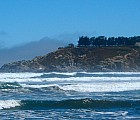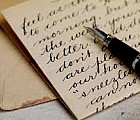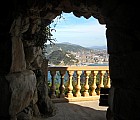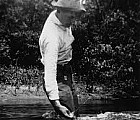The hurly and burly

Tonight I listened to another Hadley Tape and thought once again that that I am likely listening to them in the wrong order. The tape I heard tonight seems to be the beginning, as both Hadley and Alice are tentative as they begin their conversation. Hadley is reserved and not as candid as she is on later tapes, when she is in full form and enjoying her opportunity to tell stories. Their conversation is more of a survey of the Paris years, rather than a discussion.
Another clue that their conversation is just beginning is that both women are very curious about operating the tape recorder. The tape starts out with Alice assuring Hadley that it is running. It’s amusing to hear them talk about the tape recorder, which must have been a new gadget to both of them in 1971. Hadley asks, “Is the tablet in?” and then considers that ‘tablet” isn’t the right word. “Should I be hearing a buzzing sound?” Alice says, “It’s turning. . . see, this turns around . . . ” to which Hadley says, “Well God bless all of us!” Moments later, Hadley, ever the entertainer, mentions that she needs to sit in a different chair because she is having trouble with her girdle.
As they begin to talk about Paris, Hadley remembers the apartment where they first lived. She describes the small kitchen and dining room and the large bedroom, which they sometimes used as a living room. The apartment came with the services of Marie Cocotte, whom Hadley describes as a very pretty Breton woman who became their guide to life in France. “We were utter strangers in Paris” Hadley remarks, and Marie taught them a lot. She was a wonderful cook and “Ernest was a very adept tipper. He kept her very contented.” Marie made wonderful dinners which they enjoyed and sometimes shared with their friends, going downstairs afterwards to dance. Marie eventually became Bumby’s nurse a few years later, when she and her husband Tonton doted on him and fostered Jack’s knowledge of French and military history.
Hadley tells Alice about how the room were furnished, adding that there was an enormous mahogany bed with a very good mattress because the French “believe in sleeping and all the things you can do in bed.” Hadley describes their neighborhood as rough, with working class people, drunkards, and “coarse singing up and down the streets.” There was a lot of noise from downstairs and “the accordion would go on until you woke up and it was morning.” In other recordings, Hadley would have embellished this story – telling Alice who danced with who and how marvelous it all was. But this conversation is almost seems abridged!
Alice asks Hadley if they were hungry in Paris, and if the story in A Moveable Feast about eating pigeons was true. “Well I think it’s one of the best make ups I’ve ever heard” says Hadley, although many Americans believed it. Later in the tape when they are talking about the parks in Paris they laugh about the pigeon story again, trying to remember the French word for pigeons. Alice knows the German word, but the French word eludes them. Hadley is confused for a moment and thinks that Ernest would certainly have been arrested if he was shooting pigeons in Luxemburg Gardens, but Alice reminds her of how the the story is told in AMV.
Alice and Hadley talk about some of the people they met in Paris, such as Gertrude Stein and Ezra Pound. Ezra came to their house often and both he and Gertrude wanted to teach Ernest how to write and later took credit for it. Hadley brings this up again later in the conversation, saying that Ernest gained insights from many people but was completely original, a trait that Hadley admires very much.
Alice then asks about meeting F Scott Fitzgerald. “I remember when he came with Zelda it was about 10 o’clock in the morning and they were two absolutely frayed-out-looking human beings, both very good looking, full of style, charm, everything. Zelda was very surprised that I looked sort of fresh – I had done some sleeping. She felt that was wonderful because they drank all night long. It’s a wonder they survived at all.”
“Did you enjoy her?” Alice asks, meaning Zelda. “I enjoyed looking at her.” Hadley answers, “She was a very pretty Southern girl, very blonde.” The tape scrambles a bit here and Hadley is talking about the time she went with Zelda to one of her ballet rehearsals and watched. “Did you enjoy him?” Alice asks, meaning Scott. Hadley says, “Not too much.” Scott was supposed to be a fascinating man to get to know but “I had a fascinating husband of my own.” She said. The Fitzgerald’s came to the apartment at odd hours, sometimes as late as 4 or 5 in the morning. “They were just like mischievous children, both good looking.”
Did you have your own friends, Alice asks and Hadley says she didn’t. “I was very lonely, as they say all brides are. A very special point of focus in our lives was Shakespeare and Company and we went there all the time.” Ernest went there much more often that Hadley did, but they always met interesting people there including James Joyce, who they admired but did not find accessible.
Alice and Hadley move quickly through some of their Paris activities. Ernest wandered around Paris a great deal by himself and Hadley eventually explored Paris too, but separately. She eventually knew it very well. Of horse racing Hadley says that ”we weren’t rich enough to lose much if you know what I mean.” They talk briefly of Hadley’s spontaneity and how much she enjoyed learning how to ski, “wonderful locomotion” she muses. They also spoke of going to the fights, which was common for French women but not Americans. Hadley said that Ernest loved to explain everything to her after the fights when they got home.
Alice asks if this was Hadley’s first time in Europe and Hadley tells her about the trip she took with her mother and sister when she was 17. Hadley contemplates what they’ve been talking about and ponders aloud that her travels with Ernest were quite different: there was no “hurly burly, no roughnecks, no going to see the fights.”on her first trip. With Ernest, she continues, “We liked the hurly and burly and it was the best time I had in my life, no comparison. Nothing compared to this, right out in the world.”







Wonderful, rich and evocative post, Allie! You bring life to these people and in that, we are grateful. They leap off the page/blog and are very much alive again!
Another great post Allie – keep it coming. Your blog is phenomenal! Jill
Reading your description of the conversation was every bit as good as listening to the tape. Really enjoyed Hadley’s discription of The Fitzgeralds.
Wow what an excellently crafted post. Those tapes sound like a gem of a resource. I am glad they came into the right hands(allie’s) so they can be shared with the world in such and interesting and fun way
Thanks agian Allie keep it up
Sincerely
Andrew Levingston
Allie, one of my favorite blogs at The Crowded Leaf just posted a quick overview on a new book out called The Paris Wife by Paula McClain. It’s Hemingway’s time in Paris told from Hadley’s point of view — thought you maybe interested in this if you haven’t already seen it!
Thanks for letting me know – there is an interview with Paula McLain about her novel on an earlier post dated April 14th, 2010. It sounds like a wonderful book!
Allie
I aam genuinelyy happy to glance at this weblog posts which includes plejty of helpful information, thanks for providing
these information.
Toys R” Us will certainly maintain making the videos well beyond the holiday season, said Wil Boudreau, chief imaginative officer at BBDO Atlanta, the seller’s ad agency for its total vacation project.
Perhaps my favored method to up the experience during unboxing is the
approach of utilizing a tool to add a natural, physical
encounter to the clients.